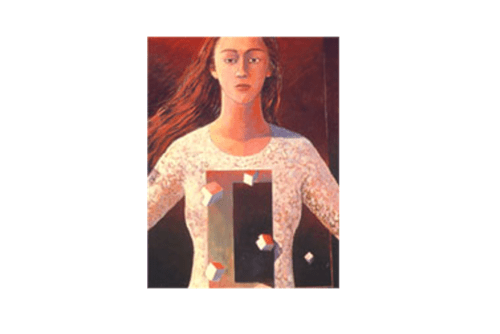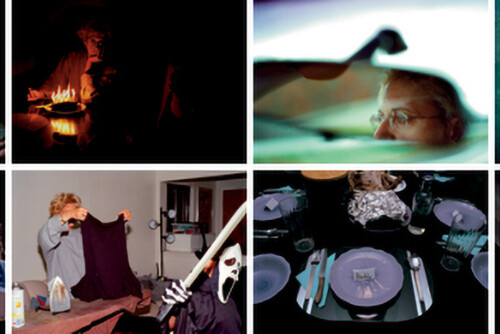Poet’s note: These different pieces that I am enclosing for S&F Online both have to do with the question of what it might mean to live in a world without the fear of violation, whether the violation has to do with words that come of one’s mouth and flesh, or whether it has to do with the simple right to stand in one’s own doorway, at one’s threshold, without being gunned down. And now I speak of the poem for Amadou Diallo, “Spring Already,” which I recently completed. I read the poem out first in a draft form last April, standing on a flatbed truck in Jackson Heights, Queens, at Desis for Diallo, a gathering of South Asians protesting police brutality. While the poem that has the child at its centre, “Illiterate Heart,” seems to come from another world entirely, one and the other help map out this moving world I inhabit, a world of migrant memory and multiple languages at the rim of the twenty-first century.
Meena Alexander
April 1, 2001
Illiterate Heart*
by Meena Alexander
*Reprinted with permission from Meena Alexander, Illiterate Heart, Evanston, Ill: Triquarterly Books/Northwestern University Press, 2002.
“Fallings from us, vanishings”
Wordsworth
for Adrienne Rich
1.
One summer holiday I returned
to the house where I was raised.
Nineteen years old I crouched
on the damp floor where grandfather’s
library used to be, thumbed through
Conrad’s Heart of Darkness
thinking why should they imagine no one else
has such rivers in their lives.
I was Marlowe and Kurtz and still more
a black woman just visible at the shore.
I thought it’s all happened all happened before.
So it was I began, unsure of the words
I was to use still waiting for a ghost
to stop me crying out:
“You think you write poetry! Hey you –“
as he sidestepped me dressed neatly
in his jurta and dhoti
a mahakavi from the temples of
right thought.
Or one in white flannels
unerringly English lured from Dove Cottage
transfixed by carousels of blood
Danton’s daring, stumbling over stones
never noting his outstretched
hand passed through me.
2.
How did I come to this script?
Amma taught me from the Reading Made Easy
books Steps 1 & 2 pointed out Tom and Bess
little English children
sweet vowels of flesh they mouthed to perfection:
aa ee ii oo uu a(apple) b(bat) c(cat) d(dat)
Dat? I could not get, so keen the rhymes made me,
sense overthrown.
Those children wore starched knicker
bockers or sailor suits and caps
waved Union Jacks,
tilted at sugar beets.
O white as milk
their winding sheets!
I imagined them dead all winter
packed into icicles,
tiny and red, frail homunculus each one
sucking on alphabets.
Amma took great care with the books
wrapped them in newsprint lest something
should spill, set them on the rosewood sill.
When wild doves perched they shook
droplets from quicksilver wings
onto fading covers.
The books sat between Gandhi’s Experiments
with Truth and a minute crown of thorns
a visiting bishop brought.
He told us that the people of Jerusalem
spoke many tongues including Arabic, Persian
Syriac as in our liturgy Aramaic too.
Donkeys dragged weights through tiny streets.
“Like our buffaloes,” he laughed.
I had to perform my Jana Gana Mana for him
and Wordsworth’s daffodil poem —
the latter I turned into a rural terror
my version of the chartered streets.
3.
What beats in my heart? Who can tell?
I cannot tease my writing hand around
that burnt hole of sense, figure out the
quickstep of syllables.
On pages where I read the words of Ghandi
and Marx, saw the light of the Gospels
the script started to quiver and flick.
Letters grew fins and tails.
Swords sprung from the hips of consonants,
vowels grew ribbed and sharp.
Pages bound into leather
turned the colour of inks.
My body flew apart:
wrist, throat, elbow, thigh,
knee where a mole sprang,
bony scapula, blunt cut hair
Then utter stillness as a white sheet
dropped on nostrils and neck.
Black milk of childhood drunk
and drunk again!
I longed to be like Tom and Bess
dead flat on paper.
4.
At noon I burrowed through
Malayalam sounds
slashes of sense, a floating trail.
Nights I raced into the garden.
Smoke on my tongue, wet earth
from twisted roots of banyan
and ficus Indica.
What burnt in the mirror
of the great house
became a fierce condiment.
A metier almost:
aa i ii u uu au um aha ka kh
ga gha nga cha chha ja ja nja
njana (my sole self), njaman (knowledge)
nunni (gratitude) ammechi, appechan,
veliappechan (grandfather)
Uproar of sense, harsh tutelage
aana (elephant) amma (tortoise)
ambjuan (lotus).
A child mouthing words
to flee family.
I will never enter that house I swore
I’ll never be locked in a cage of script.
And the lotus rose, quietly, quietly
I committed that to memory,
later added: ce lieu me plait
domine de flambeaux.
5.
In dreams I was child babbling
at the gate splitting into two,
three to make herself safe.
Grown women combing black hair
in moonlight by the railroad track
stuck forever at the accidental edge.
O the body in parts,
bruised buttress of heaven!
She cries,
A child in a village church
clambering into embroidered vestments
to sing at midnight a high sweet tune.
Or older now
musing in sunlight
combing a few white strands of hair.
To be able to fail.
To set oneself up
so that failure is also possible.
Yes,
that too
however it is grasped.
The movement towards self definition.
A woman walking the streets
a woman combing her hair.
Can this make music in your head?
Can you whistle hot tunes
to educate the barbarians?
These lines took decades to etch free,
the heart’s illiterate.
The map is torn.
Someone I learn to recognize,
cries out a Kurtz, thrusts skulls aside
lets the floodwaters pour.
Copyright © 2002 by Meena Alexander. Published by TriQuarterly Books/Northwestern University Press. All rights reserved.
Spring Already**
by Meena Alexander
**An earlier version of this poem was published under the title “Color of Home” in Paterson Literary Review.
1.
Spring already, wild strew of apple blossom, tapers setting light to moist sidewalks.
Children at the subway’s edge, singing in crude chorale.
Sometimes the earth seems heaven enough.
Amadou Diallo I thread my way through city streets brooding on your death.
A man in a torn coat crouches in a vestibule.
A couple thrust into the wind, she grips a sunflower wrapped in a cellophane cone.
Behind a wooden door, cases of glass, letters arranged, postcards too, on ivory walls
framed images, the whole entitled Without Sanctuary.
2.
What can I say? My mind was blown away.
There they hung wind looped, sun scratched, bodies of black men at the rude rim of heaven.
Names cluster: Frank Embree, Jack Smith,
Ted Washington, Will Moore, Laura Nelson and her son L.W.
Sepia stained, feather soft, strung over the waters of an Oklahoma river.
Beneath, kindliness of native dirt and rock where clumps of sunflowers seed themselves.
Ranged on the bridge a row of men in hats, hands on the rail,eyes trained to brown water..
3.
Outside the museum its night already,
bruised petals of the sunflower make tracks of sulphur in this northern sky.
Inside my own flesh I turn into a ghost,
the past is fitful flashing .
Words cannot fix a chair, a bed, a habitation.
I cannot see ahead as Amadou Diallo I try to follow you into a dark doorway.
Behind you, accoutrements of the ordinary
table, chair, TV, flashlight, sneakers, videotapes.
Barely adult you man the vestibule one hand raised.
I hear you whisper: Come look. It’s I, Amadou!
Police bullets start to slide through ribs and heart,
the quiet infolded parts, shattering the white threshold
4.
Cries, shuffling steps, wings of a dove battering air on Wheeler Avenue.
Chin up eyes shining in the photos that outlast you
I see you soar into the broken passages
no map will ever score.
Torn petals of the sunflower stud your hair .
Stations of our exile etched through flesh, sky driven.
5.
Your father travelled hard.
Places were gemstones in his hands:
Conakry New York Ho Chi Minh City.
He washed his face his feet, before entering your death place.
Your mother Kadiatou stooped to the sidewalk,
hands raw,giving birth to you all over again in this cold air, in a rocking grief,
words cannot mark nor clothing cover.
Shining, leapt from a mother’s thighs
they turned you into meat littering the doorway.
Bloody tracery of skin and bone.
How could this be what your traveller’s heart ached for?
How could this be the threshold of heaven?
And the soul, too many doorways now, swims out, confused, granted passage.
Will the soul turn back, stare at the body its old nest ?
Man child in the promised land you sought so hard
Amadou Diallo , what is the color of home?
6.
They laid you in the soft earth of Hollande Bouru,
piled twigs of fragrant wood, crushed leaves.
The earth rolls on.
Sunflowers spike their seed, orange trees blossom by your grave.
Outside the mouth of Central Park
I stand in a chill wind trying to set words to raw shuttlings.
I touch bruised skin beneath my blouse,
frail collarbone beneath a scarlet scarf
marking the edginess of hope, frank scent of survival.
Lovers quicken in the mist,
apple blossom spills through stone crannies
as you Amadou killed far too young beckon drawing me down,
down into this city of migrants and native clamor,
her fierce hope afloat in rivers filled with torn petals, swollen condoms, stained feathers.
7.
I sing this elegy
not knowing what death dares us to.
Will eyes slip into other eyes,
lips into other lips,
throat into another throat,
tugged through ring after ring of hope, a mothering emptiness?
Abacus of desire, precious unbuckling of sense.
Heart sutra of the exile.
Rarest translation here on this island
where raw roots clamor.
Where home marks a site
without density or color
Fragrant as blossoms in this northern sky,
wind loosed forever nameless.
March 15, 2000 – January 25, 2001
New York City




